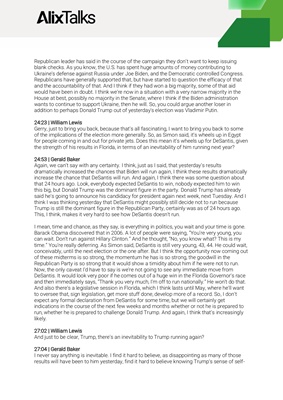
look at what your risk is of enforcement with regard to the United States, I think as sort of a
primary concern, and make a balance and try and figure out if that's a realistic threat or risk, or
are you de-risking completely unnecessarily? And are you ignoring the fact that you've got this
Chinese anti-foreign sanctions law that actually might have a more direct impact on you than
sort of an existential threat that at some point the United States might turn its attention to
you.
So, there is a balance there that you've got to strike. And it's one of those things that
consulting with other folks in your industry, consulting with your consultants that you've hired
to give you advice on these risks and making sure that you're accurately balancing and
weighing the risks before you make a decision as to which side you're going to be on.
27:52 | William Lewis
Ok, so, Guy, in light of this complexity and the disparities, obvious question, but how effective
actually are the current sanctions? Because I did read with some interest in the week Alexei
Mordashov and the way that he appears to have moved billions of dollars' worth of assets
ahead of time, I think the FT reported a stake in Tui, for example, that he moved into the
ownership of his third wife. What are some of the tricks that oligarchs are using to avoid, and
can you tell us your view about the broad effectiveness of them, please?
28:38 | Guy Harrison
Sure. I mean, firstly, thank you for directing that last question to Wendy, not me - whose rules
matter? And Wendy, compliment you on your answer there, it was excellent.
So, I think you're exactly right. We touched on it earlier, right? While there are safe havens for
all these sorts of assets, and while these sanctions are being signaled well ahead of time,
people are able to circumvent them and store these stores of wealth offshore and away from
sanctioned entities. I think, you know, I definitely echo what Wendy was saying before in terms
of just how difficult these sanctions are to implement because of the disparities between the
different regimes, and then also understanding really what sits in your supply chain, what sits
in your customer base, who are my suppliers' suppliers, right? And it seems that's especially
important at the moment, because in the court of public opinion, really there seems very little
forgiveness.
You talked earlier about some of these French companies, and we saw what happened with
Decathlon last week and the reversal of their decision to stay in Russia and in fact, actually
pull out. So, they are incredibly difficult to navigate. I think knowing who you're doing business
with is the most important step in the implementation of those regimes.
Coming back to your question on the effectiveness, though, Will. I think until we see oil and
gas really come into these regimes in a meaningful way, and actually Russia isn't able to run a
current account surplus, it will be arguable about how effective these sanctions are. If we go
back to what happened with Iran, they saw a 20% drop and recession in their economy. They
still stuck it out for an exceptionally long time. And I think that could well be the case with
Russia as well.
30:48 | William Lewis
Ok, well, let's get into the gas question, Guy, off the back of that, because I can detect from the
questions that are coming in, and thank you very much to the audience for the questions, they